Student Blog
First-Gen
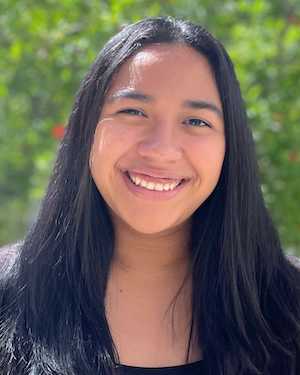
So What Now? ⟩
July 29, 2022, by Andrea
Classes First-Gen Getting Involved What are OS/OT?
So you just discovered OT. Maybe your overly excited roommate shared with you the major or you heard about the amazing occupational science minor classes, like Creativity Workshop from a classmate. No matter how you discovered OT, the field piqued your interest.
Now you may ask yourself, how can I learn more about OT and/or get involved at USC as an undergraduate student? Well, here are some ways you can do just that!
Pre-OT Club
The Pre-OT Club is a great way to learn more about OT through presentations, networking opportunities and guidance from current OT faculty members. The club is open to all USC undergraduate students interested in OT. From collaborations with other health profession clubs on campus to providing advisement for applying to OT graduate school, the Pre-OT club explores ways to dwell deeper into the field of OT.
OS Minor
Whether you have extra units, are ambitious to pick up a minor or are committed to applying to OT graduate school, pursuing an OS minor may be the right choice for you. Minoring in OS prepares you for the career of OT as well as exploring its uniqueness and versatility. Classes like Doing Social Justice and Creating a Sustainable Lifestyle are some examples of such versatility and how anyone can find their path to OT. I never miss an opportunity to recommend an OS class to my friends looking for a fulling class. One of my favorites to recommend is OT 100: THRIVE: Foundations of Well-Being. I took OT 100 online as a freshman and was able to foster vulnerability with my small group as we explored what it meant to thrive in all aspects of life. It’s a great course to learn more about well-being from an OT lens!
Volunteering
Getting hands-on experience is a great way to further your understanding of OT and the daily tasks of a therapist. Because of the many settings OTs can work in, consider volunteering at various sites and/or with different populations/communities. Click here to find a site!
Networking
The “Trojan Family” doesn’t just describe the relationships you build with other USC students, but also the relationships between faculty and students. Consider conducting an informational interview with a faculty member. After a coffee chat or zoom call, speaking with a current OT professional can provide you with relevant information about working in OT, expand your knowledge of the unique pathways, and provide guidance to your journey in OT. One of the ways I was able to network with USC Chan alumn was through the Trojan Network. During my time in the first-generation mentorship program, I was able to connect with current OTs who shared with me their journey to OT and her advice. Alum, Dr. Joyce Yoo, shared with me the importance of getting to know my colleagues and peers “as they are peers as they too are doors of future opportunities.”
In short, your journey to OT doesn’t start at the graduate level! The opportunities here at USC allow you to pursue OT at any point in your undergraduate experience.
As an undergraduate student myself, a rising junior in the BS-OTD program, I love to talk to other students about my passion for OT and always pitch the idea of exploring OT for themselves. If you need any more convincing, let’s have a chat!
⋯

Learning and Applying ⟩
July 15, 2022, by Andrea
Diversity First-Gen Getting Involved What are OS/OT?
Coming to USC, specifically to USC Chan, my passion for OT grew as I became more immersed in my classes and the opportunities for learning more about the profession. One of the ways I was able to explore my desires as a professional was through the Summer Institute.
I attended the Summer Institute in the summer of 2021 in the hope of gaining a clear direction in my journey as an OT student and exploring the unique disciplines. Throughout the six weeks, we explored our goals academically and professionally, gained mentorship, and the ways in which we can reduce health disparities in minority populations.
The most impactful week for me was when we held a student panel. It was a space where current students provided honest insight into their journey into OT as it related to their identities — first-generation and/or POC. Hearing from each panelist about how they were introduced and came to love their professions was definitely a highlight. The diversity in their journeys was a reminder that everyone has their own set path.
Some aspects that I continue to utilize even after the program are the tips on how to seek mentorship and professional development. Seeking mentorship can be a daunting task, but I was able to understand that it can be a process. It’s not always that the first person you cold email will respond. Being a mentee in any program requires flexibility, following up, and good communication. I utilized these skills in my sophomore year in the USC First-Generation Mentorship Program with my own mentor which better prepared me as a mentee. Learning how outreach to OT professionals was a skill I gained confidence in.
As the current cohort for the Summer Institute of 2022 is in the midst of their program, I encourage you to invest in fruitful connections within your cohort and faculty. Each person in that zoom call has a passion for OT and the ways we can impact our communities. Through my experience in the Summer Institute, my passion for serving the Latinx community was solidified and my confidence in my own journey was strengthened. The growth and learning don’t stop at the end of the six weeks, instead, it only marks the beginning of your journey as a healthcare professional.
Fight On!
⋯
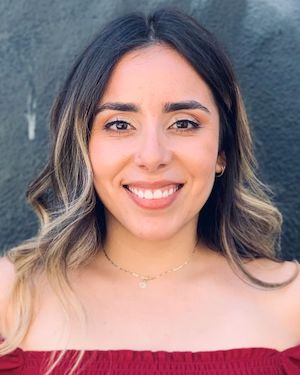
The USC U don’t C ⟩
April 21, 2022, by Silvia
Admissions Community Diversity First-Gen Getting Involved
No todo es color de rosa. Like my friend Rolly says, “There is a USC that you don’t see.”
Holistic admissions? I love it. I am all in for decreasing barriers and increasing access for students to enter spaces of higher education. Do you know the percentage of Latinx individuals in higher education? There is not many of us, but that is changing. We are changing it.
As the new director of admissions, Dr. Anvarizadeh and her team pushed for a holistic process that would view applicants as whole individuals—considering their core values, thoughts about equity, diversity, and inclusion, etc. — and not just as a set of test scores or GPAs. Let me tell you why this has been a game changer, but more importantly, why the work can not stop only with holistic admissions.
⋯
In 2018, I graduated from Cal Poly SLO with my first collegiate degree. The time that I had to rejoice in that feeling of being the first in my family to graduate college was short lived as my dad would be losing his job shortly after. I was quickly reminded of my role and my identity as a Mexican daughter, the eldest child in a family of eight. My educational and career goals were put on pause because as I was raised, in my Mexican culture, family comes before and is above everything. Naturally embracing that role, I texted my brothers to figure out how we were going to pull through, like we always do.
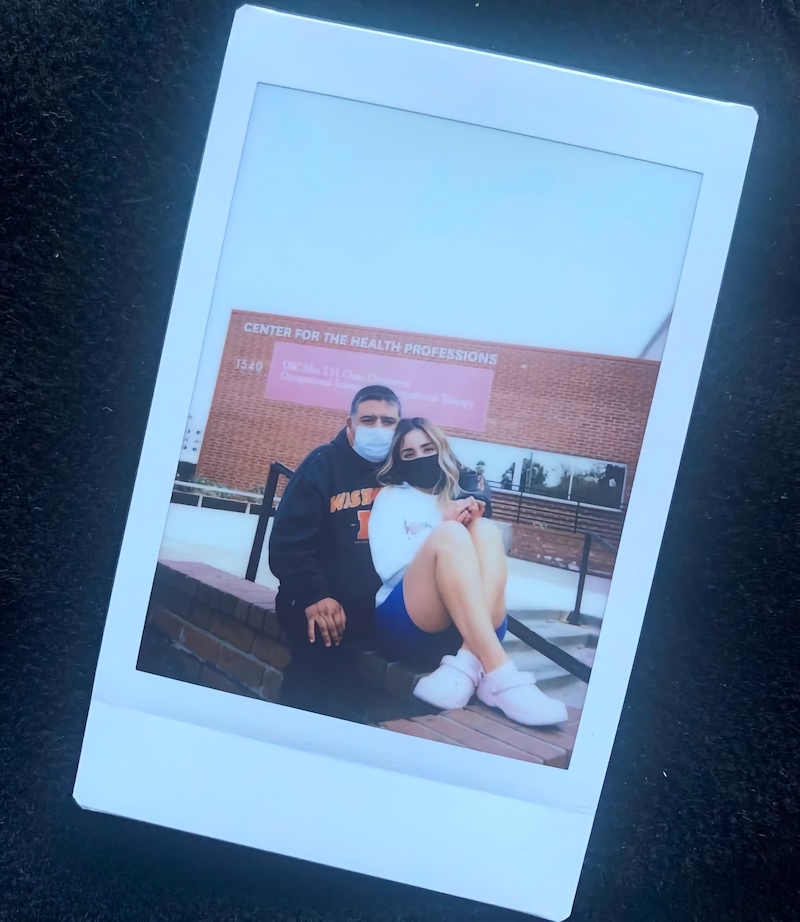
Mi papá y yo at CHP
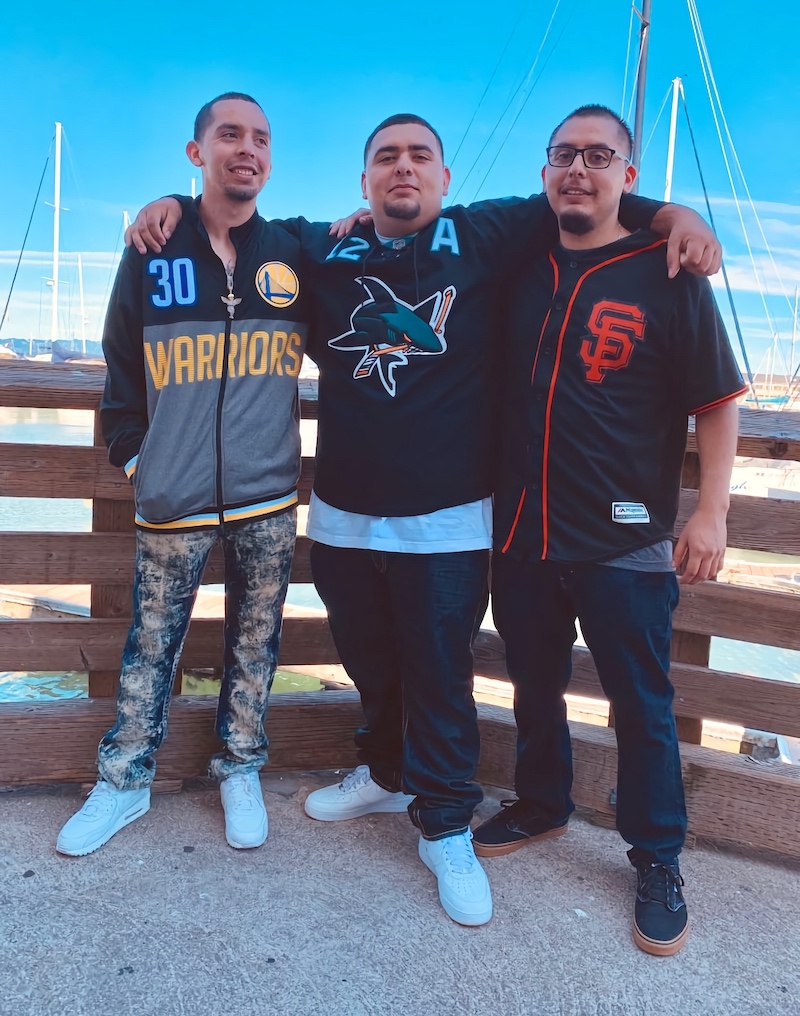
My 4Lifers, mis hermanos
For the next year or so, I worked Monday-Sunday and gave my dad more than half of my paycheck. When I began considering the possibility of furthering my education and applying to graduate school, I felt guilty. I felt selfish. How could I be thinking about myself and what I wanted when my dad was still not 100% back on his feet? It is ironic because even the decision of going back to school was based on helping my parents. I needed this degree to be able to get a job in my field of interest and so that I could earn more money to give back to my family. That is how collectivist cultures like mine work.
The thought of resuming my role and identity as a student was great, but with what money and what time? What money was I able to save for grad school? What money did I have to spare to take the GRE more than once or to spend on study materials, for that matter? What time did I have to sit for a 4-hour exam more than once? I didn’t. Talk about the barriers that USC Chan’s holistic admissions addressed for me. In my application video I stated the occupations that got me through the difficult time my family faced: work and prayer.
That is my story, but I write this blog to highlight the fact that there are stories behind the BIPOC students being admitted into the program that you do not see. Holistic admissions have opened the door for us to be able to step into higher spaces, but to quote my friend Miriam De La Torre, “don’t invite us into the room if there is not a seat at the table open for us.” You see the faces and numbers that represent diversity but are ignorant to the adversity attached to them. If the work is not to be performative, we cannot continue to casually disregard that the “E” in the new JEDI curriculum stands for equity vs. equality. You can’t allow us into the room to watch us stand. Students need to be supported beyond admission.
Se tenía que decir y se dijo.
All this to say that many of us BIPOC student and allies are here to keep the momentum going to make sure we continue to do the work past holistic admissions. Like Dr. Anvarizadeh said at COTAD’s “Springing into Action” virtual event, we cannot do this in silo — we have to lock arms to see it through. I hope y’all are ready for what is to come as we continue to collaborate, work together, and build community.
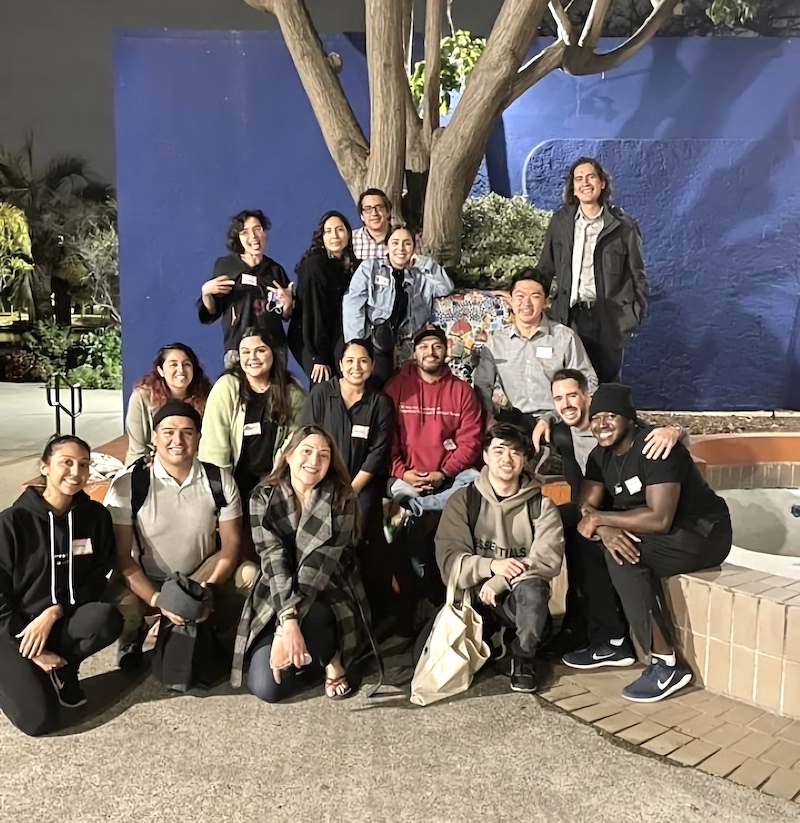
Showing up for each other: Students attend an event at Plaza de La Raza for which Dr. Diaz was a panelist
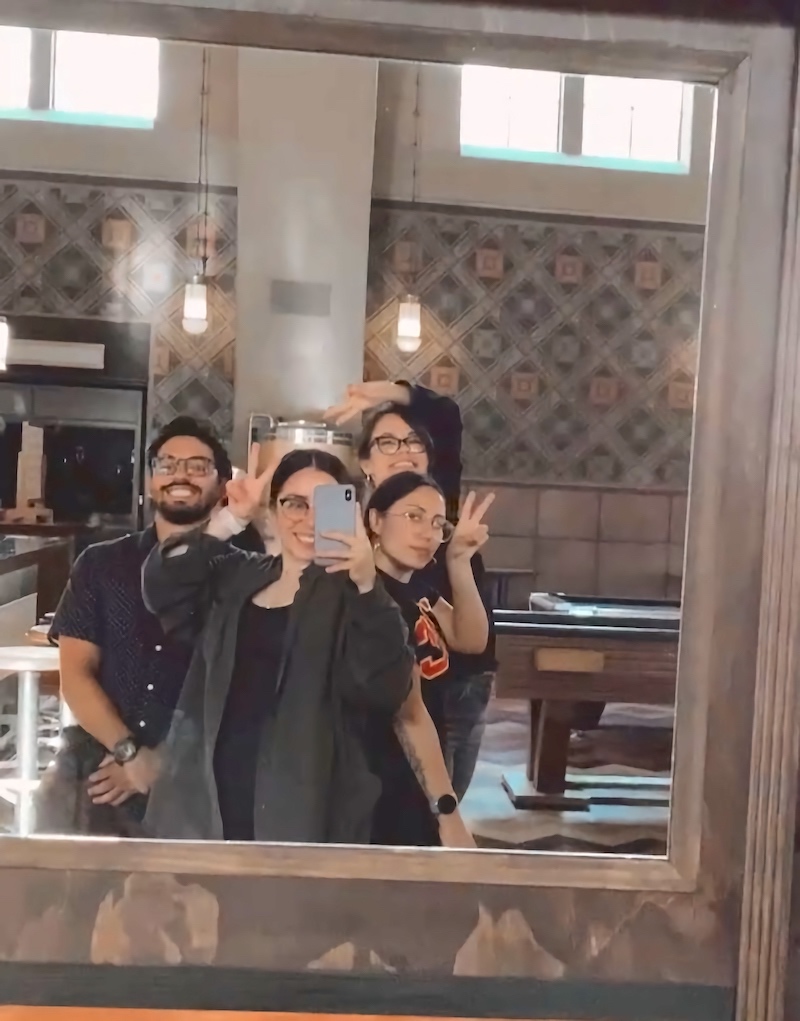
Mis amig@s y yo at one of our AHTO social events: Abraham Ramirez, Daniela Flores-Madriaga, Denisse Mendoza
⋯
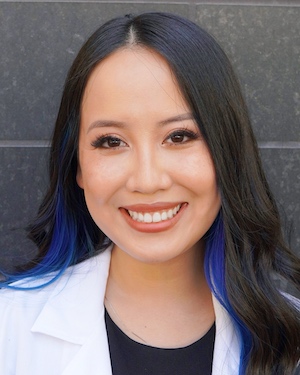
WOMEN ⟩
March 26, 2022, by Teresa
That’s it. That’s the post.
As Women’s History Month comes to an end, I’ve been reflecting on all the women who’ve helped shape me into the woman I am today while I learn how to use my voice for all the women to come. Here are some of them:
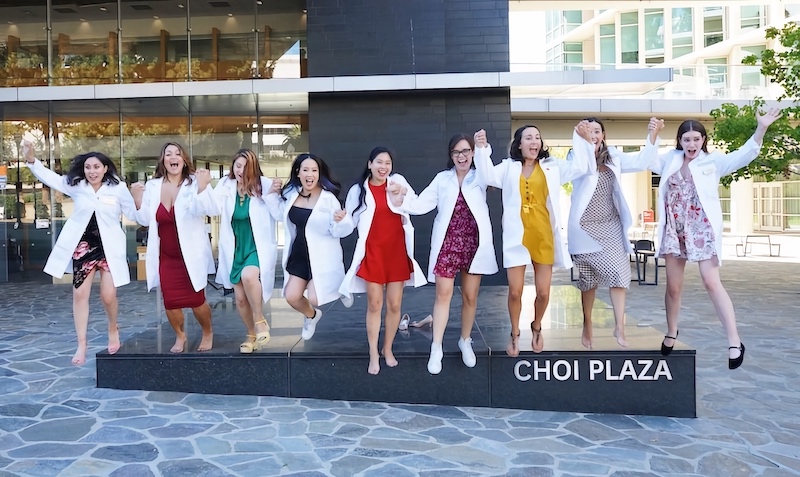
From left to right: Daniela, Michelle, Miranda, myself, Maggie, Denisse, Emily, China, Lizzo
Over 75% of occupational therapists in America are women and I can’t wait to become one of them. To enter a profession filled with such intelligent, warm, compassionate, and beautiful individuals such as the ones pictured alongside me here always reassures me that I followed the right path. Both in and out of the classroom, I learn so much from their strength, resilience, and experiences. With all of us being at Chan at the same time and learning from our professors who are some of the most powerful women I’ve encountered in this profession, we are constantly challenged to grow into our power as well.
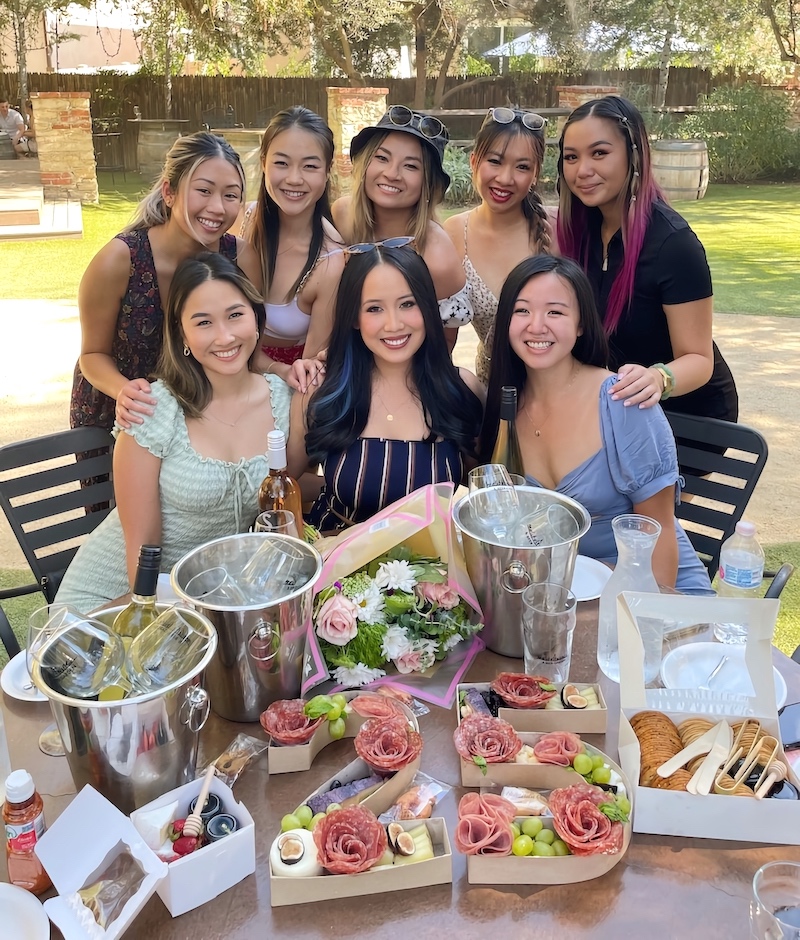
Top row from left to right: Michelle, Yuka, Courtney, Ann, Connie
Bottom row from left to right: Joan, myself, Kristine
From middle school to undergrad, I’ve found lifelong friends along the way and I am so proud of the women we’ve become and are on our way to becoming! It’s extremely empowering to see my friends achieving their goals and doing the things we talked about growing up. I love hearing their stories about their respective fields — marketing, medicine, accounting, nursing, business, social work — and only hope they feel the same whenever I talk about OT. At this point, I’m pretty sure they could give you a pretty good definition of what occupation is 😉 Whether it be moving across the country to start a new job, going to graduate school, or buying a home, I love to see my favorite women succeed. It motivates me to work toward my dreams as well, so that we can all celebrate our wins together. #WomenPostingWs
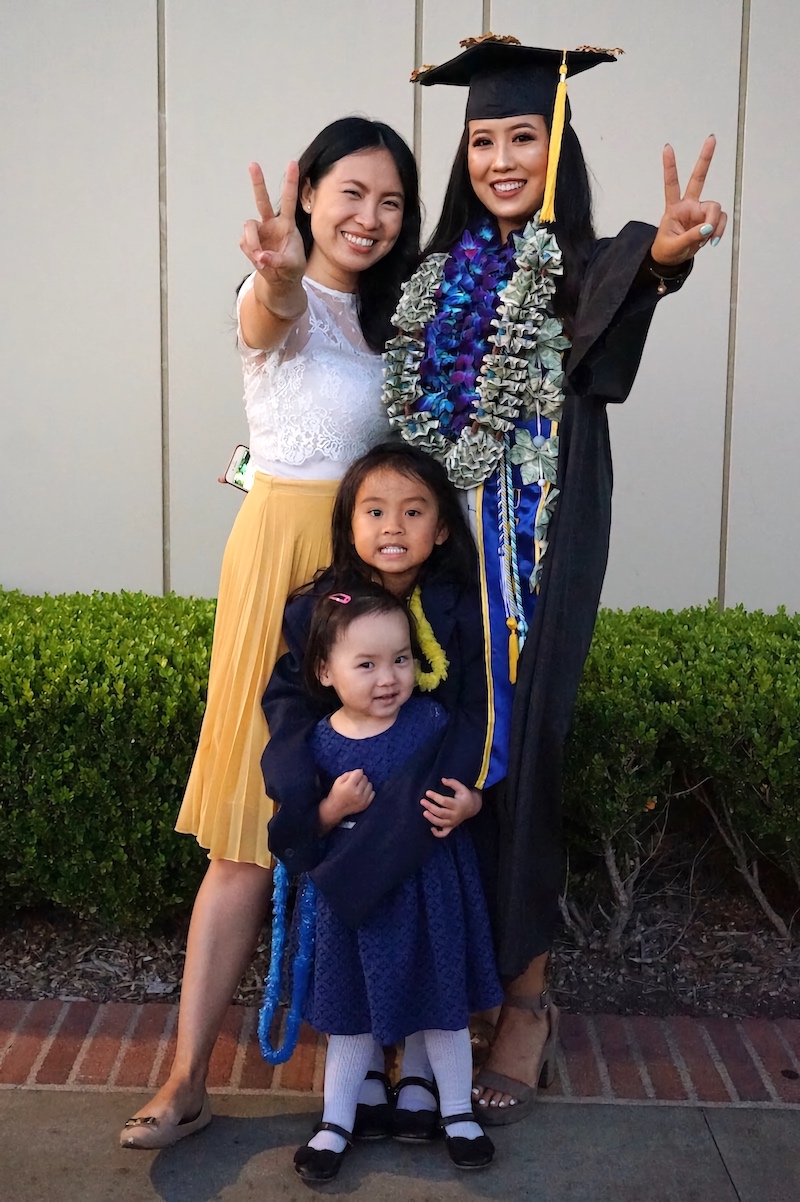
Me, my sister, Kim (USC Price MHA ’16), and our nieces manifesting Fight On ✌️ for me at my graduation from UCLA in 2018
Last but not least, there’s all the women in my family who have played a crucial role in who I am. Coming from a family of refugees and immigrants, obtaining degrees from all these fancy universities sometimes feels . . . snobby, even though it’s the very reason they came here – better opportunities for those who came after, for me. I think about this a lot and even more so once I became an aunt to two beautiful girls. While the strength, resilience, and sacrifices of my grandma, mom, aunts, and sisters have shaped who I am, my nieces help shape the woman I want to become.
When taken together, I am reminded of the complexities of being a woman, the many roles and expectations it comes with (both good and bad), and how this experience becomes further convoluted by things out of one’s control, including gender identity, being BIPOC, and the imposition of traditional gender roles. When I think about my own intersectionality, it is in relation to a new skill — learning how to use my voice to take up space. Growing up, I was told to become the docile, hardworking, obedient Vietnamese girl I was meant to be. As the youngest daughter, my thoughts often came last and my opinions were seldom considered as a serious contributor to the conversation. So as I grew into womanhood, being told that my voice mattered felt unnatural sometimes. It can still be difficult to organize my thoughts and convey them as a seamlessly delivered statement, without anticipating being silenced. I still haven’t figured out the surefire way to rectify this, but I do know how empowering it is when I use my voice and have folks right there alongside me, listening and lifting. I’d like to leave you with a poem I admire; it is my hope you use it to uplift the voices of all the women in your life, this month and every month until the end of time.
Hear me as a woman.
Have me as your sister.
On purpled battlefield breaking day,
So I might say our victory is just beginning,
See me as change,
Say I am movement,
That I am the year
And I am the era
Of the women.
“Won’t You Be My Sister?”
by Amanda Gorman
⋯

You’re Welcome ⟩
February 26, 2022, by Silvia
Admissions Diversity First-Gen
I say that in the most humble way.
Here’s the thing about being first-gen — or maybe just about me — we’ve been conditioned to feel and express nothing but thankfulness when we’re given anything (an opportunity, admissions acceptance, a scholarship, etc.), rather than saying what we truly know.
“That’s right, I EARNED that, and I DESERVE it. You didn’t just HAND it to me . . . and if we’re being honest, you kinda need me.” Try saying that with your chest next time . . . maybe after you say thank you — but you get what I mean.
As I write this blog, I find myself deleting and rephrasing because I think to myself, “other college students feel that way too,” and that’s the problem. We minimize and sometimes dismiss our feelings trying to be considerate of others. All the typical college student feelz are valid, I am not trying to take that away. What I am saying is that they are compounded by being first-gen — that’s the power of intersectionality.
I don’t just exist as a student. I exist as the first-born and female daughter of Mexican parents — parents who brought me with them when they immigrated so that I could be “first-generation,” though I don’t think that’s what they intended. Mi mamá me dice, “Yo nunca imaginé que ibas a llegar hasta aquí,” and it’s not because she didn’t believe in me, she believes in me more than I believe in myself, it’s because we come from having nothing and knowing nothing. This matters because while many of my peers were enrolled in extracurriculars, sports, being tutored, etc., in the years preceding college applications, I was cleaning houses with my mom. The moment I learned to write and speak English, which was in 3rd grade, I was making my mom’s business cards on a 3x5 piece of paper and answering the phone when people called to inquire about her services. I cleaned houses with my mom from elementary to high school, up until I left for college.
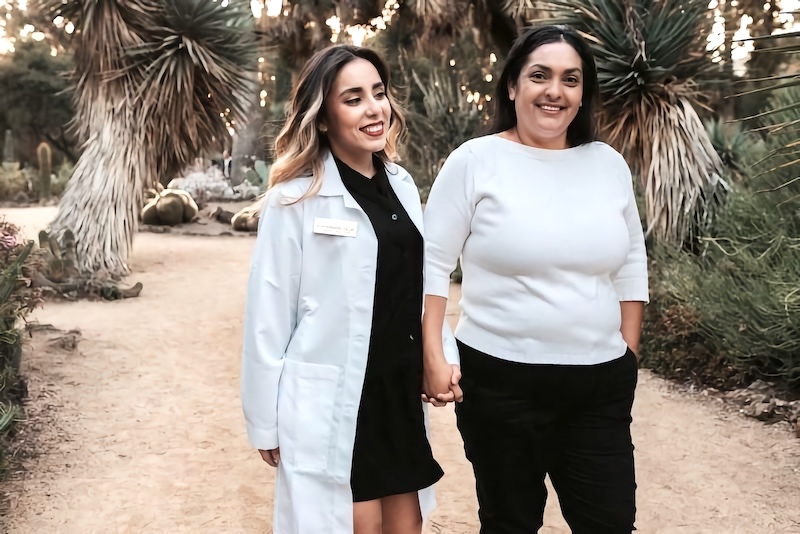
My mother’s daughter, a proud moment.
I, like many of my fellow Latinx and first-gen brothers and sisters, had romanticized going to college and couldn’t wait to experience it. The truth is, experiencing college as a first-gen student is rewarding, but it’s even more exhausting. There’s pride and there’s guilt. We’re not just navigating academics and figuring out financial aid, we’re also simultaneously carrying out roles as our families’ primary interpreters, therapists, mediators, advocates, coparents (IYKYK) and so much more. There’s pride in knowing my siblings get to wear sweaters with the names of universities they actually know about and have visited. The pride in knowing that when teachers ask if said university is where they plan to attend, they get to say, “No. My sister went there for undergrad. She’s at USC getting her master’s now,” is one of the many things being first-gen is all about. That, and the guilt that comes with it as we realize that this is only possible because our parents sacrificed their own dreams for ours.
I believe this is where the internalized superlative feelings of thankfulness stem from. Looking back to where we started, we can’t help but feel thankful for where we are now. But we’re not here because we paid our way in. I will always be thankful for every opportunity I have been given, but I will also acknowledge that it’s not a favor that is being done. Just as I remind myself that I worked for this, and I deserve it, I hope you do too.
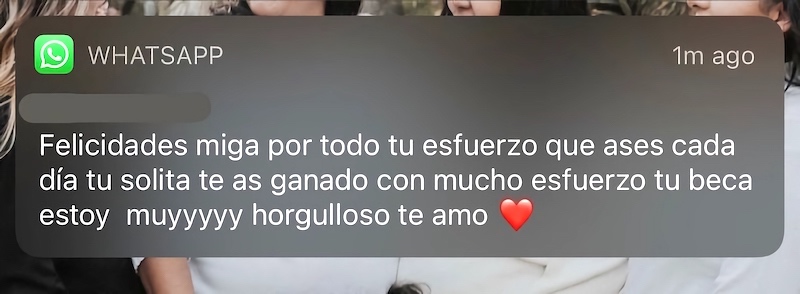
A reminder from my dad: “Congratulations mija for all of the hard work you put in each day. You, by yourself, with all of your effort have won your scholarship. I am very proud. I love you.”
So, to our alma matters (and future ones too, including USC), you’re welcome for choosing you. You’re welcome for our diversity, authenticity, and everything we have brought to the table.
—
I want to leave you with something that I was told and that I hold onto as I reflect on my journey through higher education: “You had nothing, but at the same time you had it all.” — Dr. Rafeedie
⋯





